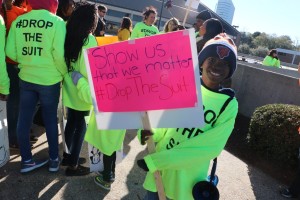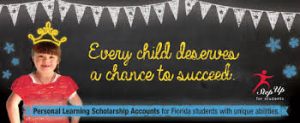Two events of national import on the school choice front in Florida deserve more celebration. Both of them – the 10,000-strong school choice rally with Martin Luther King III, and the signing of the bill expanding Florida’s education savings account program – suggest the choice debate continues to move to a less political place, or at least a more bipartisan one. Who doesn’t say hooray to that?

If expanding educational options for students with special needs is worthy of a collective cheer, is there good reason not to do the same for students disadvantaged by poverty? (Photo courtesy of Silver Media)
The Jan. 19 rally generated a flood of headlines in large part because of King. Many in the school choice realm know choice has roots on the left, but that’s not common knowledge among choice critics or reporters. So when the son of Dr. King joined thousands of low-income parents chanting “Drop The Suit!” (referring to the lawsuit the teachers union filed to kill the state’s tax credit scholarship program), fresh ink flowed by the barrel over stale narratives about right-wing plots.
The choice rally was also upbeat and nearly apolitical, unlike a teacher union rally the week prior. The choice crowd sang “We Are Family”; the union rally played “We’re Not Gonna Take It.” Nobody at the former talked about kicking politicians out of office. King expressed faith in the courts: “Ultimately, if the courts have to decide, the courts will be on the side of justice,” he told the crowd. “Because this is about justice. This is about righteousness. This is about truth. This is about freedom – the freedom to choose what's best for your family, and your child most importantly.”
The bill signing two days later didn’t get as much publicity, but it was just as meaningful. Gov. Rick Scott okayed expansion of the Gardiner Scholarship after the bill sailed through the Legislature with overwhelming, bipartisan support. Formerly called the Personal Learning Scholarship Account, the Gardiner Scholarship for students with special needs is now the nation’s biggest education savings account program. It’s a sign of where things are headed as school choice becomes educational choice, and as the forces for customizing education rise to the fore.
It’s also a sign of political progress. For those familiar with Florida’s long-running “voucher wars,” seeing Democrats and Republicans alike go all in for the scholarship was incredible. The union savaged the PLSA before it became law in 2014, and even tried to kill the bill that created it. Less than two years later, every Democratic lawmaker is on board?! The support is even more stunning given how partisan school choice remains in virtually every state. What quietly happened in Florida with the Gardiner Scholarship is a sign of how things can and should be everywhere, and, slowly but surely, will be. (more…)
This is the second post in our series on the Voucher Left.
Way back in 1978, when Bee Gees ruled the radio and kids dumped pinball for Space Invaders, a couple of liberal Berkeley law professors were promoting a variation on “universal” school vouchers that they believed would ensure equity for the poor. Along the way, they foreshadowed a revolutionary twist on parental choice that would make national headlines nearly four decades later.
 John E. “Jack” Coons and Stephen Sugarman didn’t use the term “education savings accounts” in their book, “Education by Choice.” But they described a sweeping plan for publicly funded scholarships in terms familiar to those keeping tabs on ESAs. They envisioned parents, including low-income parents, having the power to create “personally tailored education” for their children, using “divisible educational experiences.”
John E. “Jack” Coons and Stephen Sugarman didn’t use the term “education savings accounts” in their book, “Education by Choice.” But they described a sweeping plan for publicly funded scholarships in terms familiar to those keeping tabs on ESAs. They envisioned parents, including low-income parents, having the power to create “personally tailored education” for their children, using “divisible educational experiences.”
To us, a more attractive idea is matching up a child and a series of individual instructors who operate independently from one another. Studying reading in the morning at Ms. Kay’s house, spending two afternoons a week learning a foreign language in Mr. Buxbaum’s electronic laboratory, and going on nature walks and playing tennis the other afternoons under the direction of Mr. Phillips could be a rich package for a ten-year-old. Aside from the educational broker or clearing house which, for a small fee (payable out of the grant to the family), would link these teachers and children, Kay, Buxbaum, and Phillips need have no organizational ties with one another. Nor would all children studying with Kay need to spend time with Buxbaum and Phillips; instead some would do math with Mr. Feller or animal care with Mr. Vetter.
Coons and Sugarman were talking about education, not just schools, in a way that makes more sense every day. They wanted parents in the driver’s seat. They expected a less restricted market to spawn new models. In “Education by Choice,” they suggest “living-room schools,” “minischools” and “schools without buildings at all.” They describe “educational parks” where small providers could congregate and “have the advantage of some economies of scale without the disadvantages of organizational hierarchy.” They even float the idea of a “mobile school.” Their prescience is remarkable, given that these are among the models ESA supporters envision today.
It's also noteworthy given a rush to portray education savings accounts as right-wing.
In June, for example, the Washington Post described the creation of the near-universal ESA in Nevada as a “breakthrough for conservatives.” School choice would likely be a top issue in the 2016 presidential campaign, the story continued, with leading Republicans like Jeb Bush, Scott Walker and Marco Rubio all big voucher supporters and Democratic front-runner Hillary Clinton opposed. The story pointed out Milton Friedman’s conceptualizing of vouchers in 1955, then added, “The idea was long thought to be moribund but came roaring back to life in 2010 in states where Republicans took legislative control.”
It’s true that in Nevada, Republicans took control of the legislative and executive branches in 2014, and then went on to create ESAs. But it’s also true that across the country, expansion of educational choice has been steadily growing for years, and becoming increasingly bipartisan in a back-to-the-future kind of way. Nearly half the Democrats in the Florida Legislature voted for a massive expansion of that state’s tax credit scholarship program in 2010. About a fourth of the Democrats in the Louisiana Legislature voted for creation of that state’s voucher program in 2012. New York Gov. Andrew Cuomo has been fighting for a tax credit scholarship in that bluest of blue states – an effort in which he’s joined not only by many other elected Democrats, but by a long list of labor unions.
These Democrats are sometimes accused of being sellouts – often by teachers unions and their supporters, who have been especially critical of Cuomo. But the truth is, they can draw on a rich history of support for educational choice grounded in the principles of the American left.
The recent history of ESAs isn’t quite as polarizing as the Post suggests, either. (more…)
We thought redefinED readers would enjoy the following essay about Florida's Personal Learning Scholarship Account by Tampa, Fla. parent Mary Kurnik. It originally appeared in the summer 2015 issue of The Old Schoolhouse magazine, and is re-published with the magazine’s permission.
The PLSA is an education savings account (ESA) administered by nonprofits like Step Up For Students, which co-hosts this blog. The essay notes only Florida and Arizona have ESAs, which was true when Kurnik submitted the piece last spring. Since then, three more states have adopted ESAs, including Nevada, which created a program that is available to more than 90 percent of its students.
By Mary Kurnik
“. . . weeping may endure for a night, but joy cometh in the morning” (Psalm 30:5).
Dealing with special needs is a family journey, not limited to the child with the diagnosis. My son has unique abilities and learns differently. He happens to have autism.
For years prior to the diagnosis, we were perplexed by John’s speech patterns, motor skills, inflexibility with daily life, and adverse reactions to bright lights, loud noises, and large crowds. During those years, John had testing and therapies, but those were done on a careful schedule and budget. Often late at night, after our children were asleep, my husband and I shed tears over how we would manage to meet John’s short- and long-term needs as prescribed by his doctors. (more…)
The Florida House this morning unanimously approved legislation that would expand access to the state's newest parental choice program for children with special needs.
The legislation would allow children with muscular dystrophy and a broader range of students with autism to use Personal Learning Scholarship Accounts, a cutting-edge program created last year.
The legislation would also open the program to three- and four-year-olds, expand the services that can be paid for with the accounts, increase oversight for the nonprofit organizations that administer the program, and allow them to collect administrative fees.
The largest such organization is Step Up For Students, which co-hosts this blog and employs the author of this post.
Last year, Florida became the second state in the country to create an education savings account program, which allows parents of special needs children to use state education funding to pay for a range of education-related services, from private school tuition to therapies and textbooks.
Rep. Mike Bileca, R-Miami, backed the creation of the program last year, and helped shepherd this year's bill, which no legislator has voted against. He said he's been hearing from parents who have begun using the accounts.
"It's been nothing short of life-changing," he said before the bill passed 114-0. "Of all things that I've done personally on education in this chamber, there's been nothing more powerful for me than being able to talk with these parents and hear their stories."
Wonks and politicos weren’t the only attendees at the Jeb Bush education summit in Tallahassee this week. Parents who support educational choice were also there, including John Kurnik of Tampa, Fla., who has a 12-year-old son with autism.
A college professor, Kurnik introduced Florida Senate President Andy Gardiner, and for good reason. Gardiner led the legislative charge last year for creation of Personal Learning Scholarship Accounts, a new ed choice program for students with significant special needs. Kurnik and his wife Mary secured a PLSA for their son, and have become vocal and visible supporters.
We thought Kurnik’s prepared remarks were worth posting in full. They’ve been edited slightly for length and clarity.
Good afternoon! My name is John Kurnik, and I am honored and humbled to be speaking to you today about high-quality education for the children in our state.
First, on behalf of my son John who has autism, my wife and family, the Florida PLSA recipients and the thousands of family members, friends, neighbors, and all those who will be touched in a positive and hope-filled way … thank you ... from the bottom of our hearts.
Thank you for knowing that the educational paradigm for special needs education requires early and effective intervention if we are to help these young people maximize their special gifts in a timely manner. And until now, many families including my own, have had to triage psychologist- and physician- recommended therapies and treatments according to those available services and the family budget. Or more times than not, completely go without.
Many thanks for helping these young people and their families with the hope of overcoming hurdles to success, and giving them the possibility of a productive, full, and happy life with the blessing of the PLSA. They will benefit from the PLSA. And when they benefit, all of us – our neighborhoods, our communities and our state – will benefit too.
I congratulate you for recognizing that special needs includes hope for the parents, siblings, friends, and relatives of a special-needs child who needs 24-7 care and attention by a wonder woman or superman parent or caregiver.
Thank you for trusting us as those caregivers for our special kids to make the best decisions possible on their behalf as good stewards of these funds which allow great things to happen. Believe that the vast majority of us play by the rules, and we agonize over the best use of this precious gift. (more…)
 Parents can now apply for the second year of Florida's newest parental choice program for students with special needs.
Parents can now apply for the second year of Florida's newest parental choice program for students with special needs.
Applications opened this week for parents who want to use Personal Learning Scholarship Accounts during the 2015-16 school year, more than six months earlier than in the first year of the program.
The program was created by 2014 legislation, which recently survived a legal challenge. The accounts are intended to help parents of special needs children pay for a customized set of learning options.
The accounts are available to K-12 students with conditions such as autism, Down syndrome, cerebral palsy and five other categories of special needs. They can be used to reimburse parents for private school tuition, fees, textbooks, supplies, education software, computers, therapies, full-time tutors or even college savings.
In the first year, the state Department of Education, the Agency for Persons with Disabilities and the non-profits that administer the accounts — including Step Up For Students, which co-hosts this blog and employs the author of this post — launched the new program in a matter of months. Applications for the first year opened in August, and the first round of funding started in October.
Florida's experiment with personalized accounts that help parents meet the educational needs of their special needs children is only beginning. In coming years, it could support a key priority for the incoming president of the state senate: Helping more of those children gain access to a college education.
Senate President Andy Gardiner told a room full of education advocates and pro-reform lawmakers in Washington D.C. Thursday that he wants to work with colleges and universities to expand higher education options for special needs students. He hopes parents who use Personal Learning Scholarship Accounts for special needs students will be better able to take advantage of those options.
The accounts, created by legislation signed into law this year, allow parents of students with specific special needs to use state education funds to pay for a mix of private school tuition, therapies, home-school curriculum, and other educational expenses. They can also use the accounts to start saving for college. The program is administered by organizations like Step Up For Students, which co-hosts this blog.
Gardiner, who is the father of an 11-year-old with Down syndrome, said college often seems out of reach for parents of special needs students. They must overcome a belief that "in the eyes of society, they're not going to be able to get to that point."
He said he wants that to change. Some Florida colleges are already creating programs aimed at special-needs students, and Gardiner, who eschews the term "disabilities," hopes to create more of them.
"We'll come forward with a plan for a post-secondary option for individuals — not with disabilities, but unique abilities," he said during a panel discussion at the Foundation for Excellence in Education's annual summit.
 The annual American Federation for Children conference is one of the country’s largest gatherings of school choice advocates. So it was notable, during the most recent conference in Orlando, that speakers regularly used the terms “parental choice” and “educational choice,” but not “school choice.”
The annual American Federation for Children conference is one of the country’s largest gatherings of school choice advocates. So it was notable, during the most recent conference in Orlando, that speakers regularly used the terms “parental choice” and “educational choice,” but not “school choice.”
This shift in semantics reflects an emerging trend that’s a game changer – the expansion of choice in publicly-funded education is increasingly including learning options beyond schools.
Florida’s new Personal Learning Scholarship Account program, for students with special needs such as autism and Down syndrome, is a good example. In the PLSA program, public funds go into a bank account that parents can use for numerous state-approved educational options, including private school tuition, a suite of different therapies, curriculum materials, instructional technology, and postsecondary education and training.
This ability to use public funds to pay for learning options beyond schools allows parents to customize an education that is most appropriate for their child. To that end, there’s no doubt that in coming years, parent-controlled educational spending accounts will become more and more common. This shift from state control of education funds to parental control, combined with the movement toward customized teaching and learning, is going to revolutionize public education.
It’s also going to complicate many of our current education reform debates, and maybe make some of them moot.
For example, our current regulatory accountability systems assume students receive instruction from a single provider. But increasingly, parents are using public education funds to access instruction from a variety of providers at the same time. So, to take one hypothetical, future example, how do we assign school grades when children are simultaneously receiving instruction from a charter school, a virtual school, a magnet school and a personal trainer? When four instructional providers contribute to a child’s yearly learning gains, accurately assigning responsibility to each provider is challenging.
This same challenge extends to using yearly standardized test scores to evaluate teachers. If a child receives language arts instruction from several teachers over a 12-month period, which teacher should be held accountable for this student’s standardized test score in language arts?
Our current testing debate also feels dated. (more…)
One of the nation’s newest parental choice programs is shifting into higher gear.
 Families of hundreds of Florida students with significant special needs, including autism, Down syndrome and cerebral palsy, have been given the green light to begin using Personal Learning Scholarship Accounts for the 2014-15 school year.
Families of hundreds of Florida students with significant special needs, including autism, Down syndrome and cerebral palsy, have been given the green light to begin using Personal Learning Scholarship Accounts for the 2014-15 school year.
So far, parents of more than 1,200 students have been awarded PLSAs, which give them the resources and flexibility to access a range of educational services, including private schools, tutors, therapists, curriculum and materials. The Florida program is the second of its kind in the country, and some education policy experts see it and a similar program in Arizona as models for a new wave in parental choice.
Last week, the parents of 616 students were notified that they can begin using the accounts, which are administered by nonprofits such as Step Up For Students (which also co-hosts this blog and administers Florida’s tax credit scholarship program for low-income students). Parents of 298 more are expected to get the same notification in a few weeks.
The PLSA program was passed by the Legislature last spring and signed into law by Gov. Rick Scott on June 20. The scholarships are available to students in kindergarten through 12th grade with one of eight diagnosed disabilities. The state set aside $18.4 million for the first year of the program – enough for an estimated 1,800 students awarded an average of $10,000 each. To date, the parents of more than 4,500 students have started applications.
The scholarship accounts allow participating parents and service providers to be reimbursed for a wide range of state-approved educational services and materials. For expenses that are not pre-approved, parents can submit requests for consideration prior to incurring the expense. There is also a payment process for parents with special circumstances who cannot make purchases out of pocket.
Parents and providers can track invoices and payments electronically. Funds that aren’t used roll over to the next year. They can continue to be used for education-related expenses until the student graduates from a post-secondary education institution, such as a college or technical institute, or has gone four consecutive years after high school with no further education. At that point, the account is closed and any remaining money reverts to the state.
The application process for the new scholarships opened on July 18, two days after the Florida teachers union filed suit against SB 850, the bill that created the PLSA program. A Leon County circuit judge dismissed the suit on Sept. 24, ruling the plaintiffs did not have standing to bring the case. The teachers union filed an amended complaint on Oct. 22.
Parents of students with special needs have welcomed the program, and several PLSA parents are intervenors in the union lawsuit. See here and here for other recent coverage.
Three months after being signed into law, Florida’s new parental choice scholarship for students with significant special needs passed the 1,000 mark on Thursday. That’s 1,000 students who were awarded a new type of K-12 scholarship that allows parents to individualize their education.
The new Personal Learning Scholarship Accounts (PLSA) are available to students with autism, Down syndrome, cerebral palsy and five other categories of special needs. Parents can use the accounts to pay for a wide array of educational options, including private school tuition, therapists, tutors, curricula and materials and even contributions to a prepaid college fund.
Gov. Rick Scott signed the new parental choice program into law after the Florida Legislature passed it last spring. The state set aside $18.4 million for it, enough for an estimated 1,800 students. Step Up For Students, a nonprofit scholarship funding organization that is authorized to administer the program (and which co-hosts this blog), opened the application process on July 18.
Through Friday morning, parents had started nearly 3,700 applications.
The milestone in awarded scholarships comes as PLSA parents received encouraging news from a courtroom in Tallahassee. In July, the Florida Education Association filed suit against SB 850, the bill that created the PLSA program. But on Wednesday, Leon County Circuit Judge Charles Francis ruled the FEA member named as plaintiff did not have standing to bring the case. FEA has 15 days to file an amended complaint.
The state Board of Education is scheduled on Monday to adopt a new rule regulating the PLSA, which will open the door for the state to seed the accounts with the appropriate scholarship amounts. The statewide average is roughly $10,000. (more…)